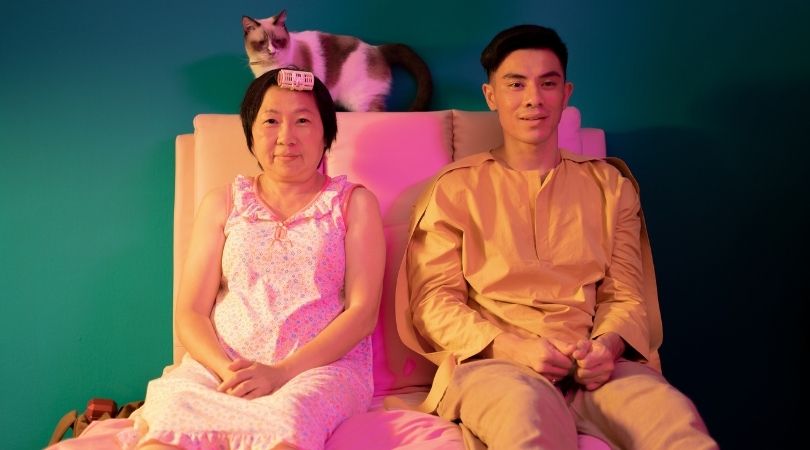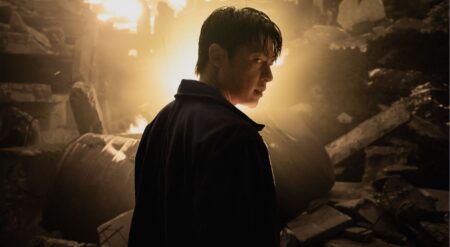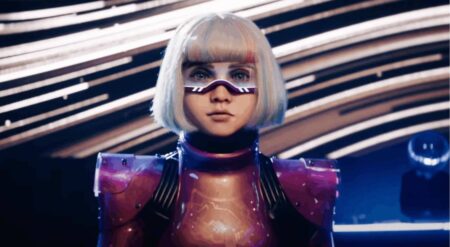
We live in an era of consumerism controlled by algorithms in charge of dictating what we should do or how we should behave. What if algorithms also controlled our happiness levels? That is the proposal of Tan Bee Thiam’s Tiong Bahru Social Club, a charming Singaporean film where narrative and aesthetics harmoniously coexist to talk about happiness, community, and loneliness.
Ah Bee (Thomas Pang) shares a great relationship with his mother, Mui (Goh Guat Kian), but after turning 30, he must leave the nest. His destination is the Tiong Bahru Social Club, a project that seeks to “revolutionize neighborhood life” with the help of a data-driven algorithmic method that aims to find ways to increase happiness levels. Here, Bee works as a Happiness Agent supporting an older client obsessed with cats named Wee (Jalyn Han).
An artificial intelligence with a Paddington-like attitude, BRAVO60 motivates Bee during his lonely times and informs him about the variations in his happiness levels. And when he is not working, Bee participates in community activities focused on reinforcing happiness, such as hug therapy or pool exercises. However, the serene and quiet Bee has difficulty adapting to this new environment: his face is only lit by forced smiles, and the algorithm’s recommendations for finding a partner or helping the community fail to fill his void.
I always find it strange when a country is named the happiest in a region. Although a “Global Happiness Index” may yield a certain result based on politics and economics, there will always be individual cases that challenge any number.
With Tiong Bahru Social Club, Tan Bee Thiam shows that happiness is not a measurable factor and that relying on algorithms will hardly be the solution to the problems of the population. Although Bee follows the algorithm’s instructions to the letter and the data suggests he’s happy, this is never reflected on his face. It isn’t until he talks to his mother or plays with his cat that a genuine smile appears. His relationship with Wee seems to be the only natural element in his life in this place. Through her cynical and honest demeanor, Wee forces him to ponder about the meaning of true happiness. These moments stand out thanks to Jalyn Han’s tremendous performance.
In contrast, when the algorithm pairs Bee with his colleague Geok (Jo Tan) to initiate courtship, the result is cold and awkward. They are forced to follow certain mechanics even when having sex, resulting in a relationship that might seem happy, but is actually emotionally unsuccessful.
Additionally, the story creates contrasts between the mechanized community of Tiong Bahru and the building complex where Bee used to live (and his mother still does), which is at risk of being acquired from an emerging multinational. Through this, Tan Bee Thiam demonstrates how consumerism can be hidden behind the kindest of corporate intentions. Nothing is free, and those algorithms are always aiming to generate some sort of profit.
This is all developed in a world that combines retro and modern styles; the club’s utopian goals are represented by neon atmospheres that highlight the artificiality of the project. The framing, pastel colors, and vibrant production design are reminiscent of Wes Anderson. Still, this aesthetic doesn’t just linger in his influence: it successfully connects to its topics, appeals to the eye, and helps maintain a playful, sweet, and comical atmosphere.
The vibrant approach and excellent use of comedy of Tiong Bahru Social Club makes it an accessible and friendly product that works as a lovely reminder that data will always be cold, and no algorithm can replace the warmth of family or an organic relationship.
Tiong Bahru Social Club is screening On Demand at the Fantasia International Film Festival 2021.
Tiong Bahru Social Club
-
Rating - 9/109/10
TL;DR
The vibrant approach and excellent use of comedy of Tiong Bahru Social Club makes it an accessible and friendly product that works as a lovely reminder that data will always be cold, and no algorithm can replace the warmth of family or an organic relationship.






